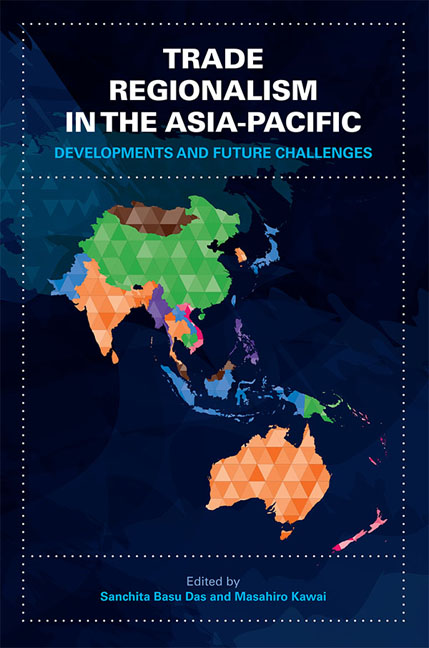Book contents
- Frontmatter
- Contents
- Foreword
- Acknowledgments
- List of Abbreviations
- The Contributors
- 1 Introductory Overview — Trade Regionalism in the Asia-Pacific: Developments and Future Challenges
- I The Trans-Pacific Partnership (TPP) Agreement
- 2 The Origins and Evolution of TPP Trade Negotiations
- 3 The Political Economy of Joining TPP: The Case of Malaysia
- 4 China and the TPP: Reflections and Responses
- 5 Japan and Entanglement of Regional Integration in the Asia-Pacific: Combining Cutting-Edge and Traditional Agendas
- II The Regional Comprehensive Economic Partnership (RCEP) Agreement
- III Regional Economic Integration: A Multi-stage Approach
- IV Old and Emerging Approaches to Asia-Pacific Regional Integration
- V Asia-Pacific Regional Integration: Towards Convergence?
- Index
3 - The Political Economy of Joining TPP: The Case of Malaysia
from I - The Trans-Pacific Partnership (TPP) Agreement
Published online by Cambridge University Press: 05 July 2016
- Frontmatter
- Contents
- Foreword
- Acknowledgments
- List of Abbreviations
- The Contributors
- 1 Introductory Overview — Trade Regionalism in the Asia-Pacific: Developments and Future Challenges
- I The Trans-Pacific Partnership (TPP) Agreement
- 2 The Origins and Evolution of TPP Trade Negotiations
- 3 The Political Economy of Joining TPP: The Case of Malaysia
- 4 China and the TPP: Reflections and Responses
- 5 Japan and Entanglement of Regional Integration in the Asia-Pacific: Combining Cutting-Edge and Traditional Agendas
- II The Regional Comprehensive Economic Partnership (RCEP) Agreement
- III Regional Economic Integration: A Multi-stage Approach
- IV Old and Emerging Approaches to Asia-Pacific Regional Integration
- V Asia-Pacific Regional Integration: Towards Convergence?
- Index
Summary
INTRODUCTION
The 2014 public debates and protests on the Trans-Pacific Partnership Agreement (TPP) are unique in Malaysian history. They are unique for at least three reasons. First, little was known about the actual content of the proposed agreements because the TPP negotiations have been shrouded in secrecy. Second, there was significant opposition against the TPP outside the government. Third, various parties that often take opposite sides on many economic and political issues were united in objecting to the TPP.
These developments have put the Malaysian government on the defensive. This leads to the question of why the Malaysian government is so committed to signing the TPP despite its lack of popularity amongst various quarters in Malaysian society. Are there potential economic benefits that accrue from the TPP that are not apparent to parties opposed to the TPP? Who are the winners and losers from the TPP?
In this chapter, an attempt is made to provide an understanding of some possible reasons underlying the Malaysian government's intention to sign the TPP. It explores the economic and political factors underlying the government's decision as well as the objections coming from outside the government.
The structure of the chapter is as follows. Section 2 provides some basic facts on Malaysia's participation in the TPP. This is followed by a discussion on how the TPP fits into Malaysia's economic strategy in Section 3. The economic benefits from joining TPP are discussed in Section 4, while its cost and distributive effects are covered in Section 5. The political economy of the TPP is discussed in Section 6. Section 7 concludes.
MALAYSIA'S PARTICIPATION IN TPP — SOME BASIC FACTS
Malaysia's interest in the TPP is related to the failure to conclude a Free Trade Agreement (FTA) between Malaysia and the United States. Malaysia started negotiating the Malaysia–United States FTA in March 2006. A key reason for Malaysia's interest in the FTA was to reverse the decline in the share of Malaysia–United States trade and Foreign Direct Investment (FDI) — a trend that continues until today.
- Type
- Chapter
- Information
- Trade Regionalism in the Asia-PacificDevelopments and Future Challenges, pp. 50 - 70Publisher: ISEAS–Yusof Ishak InstitutePrint publication year: 2016



